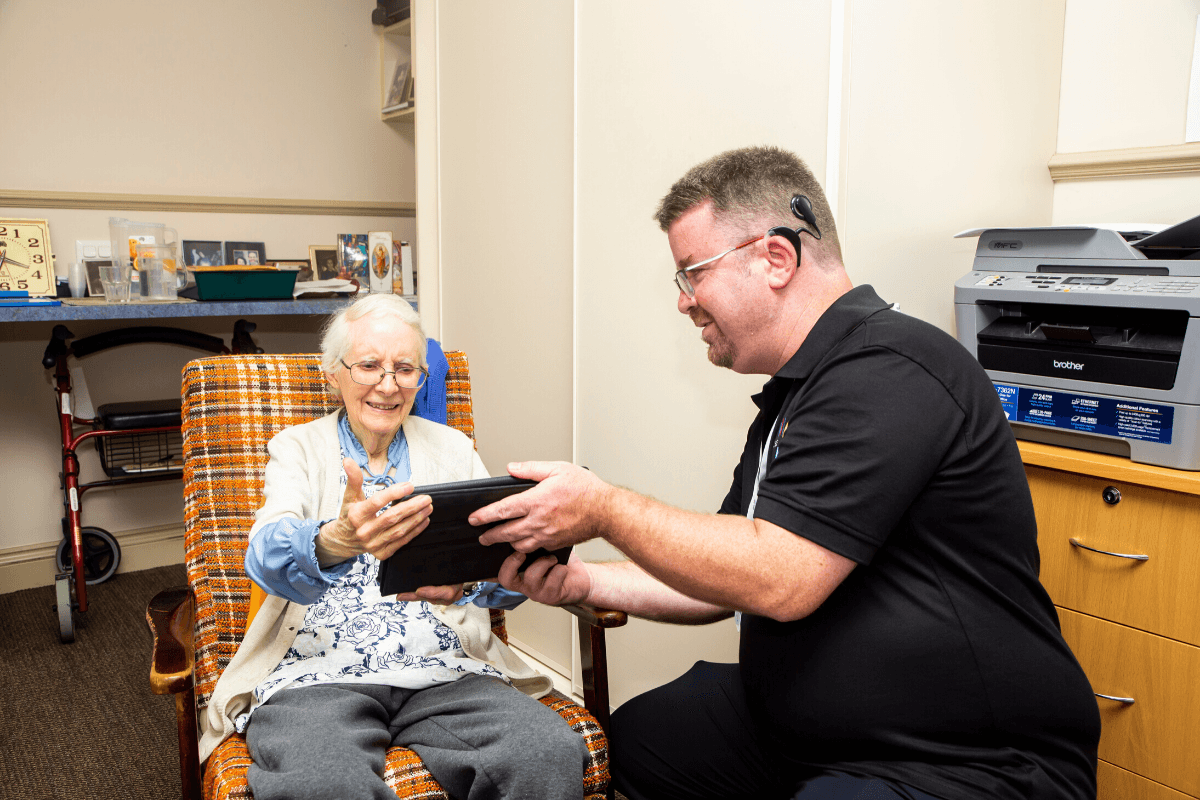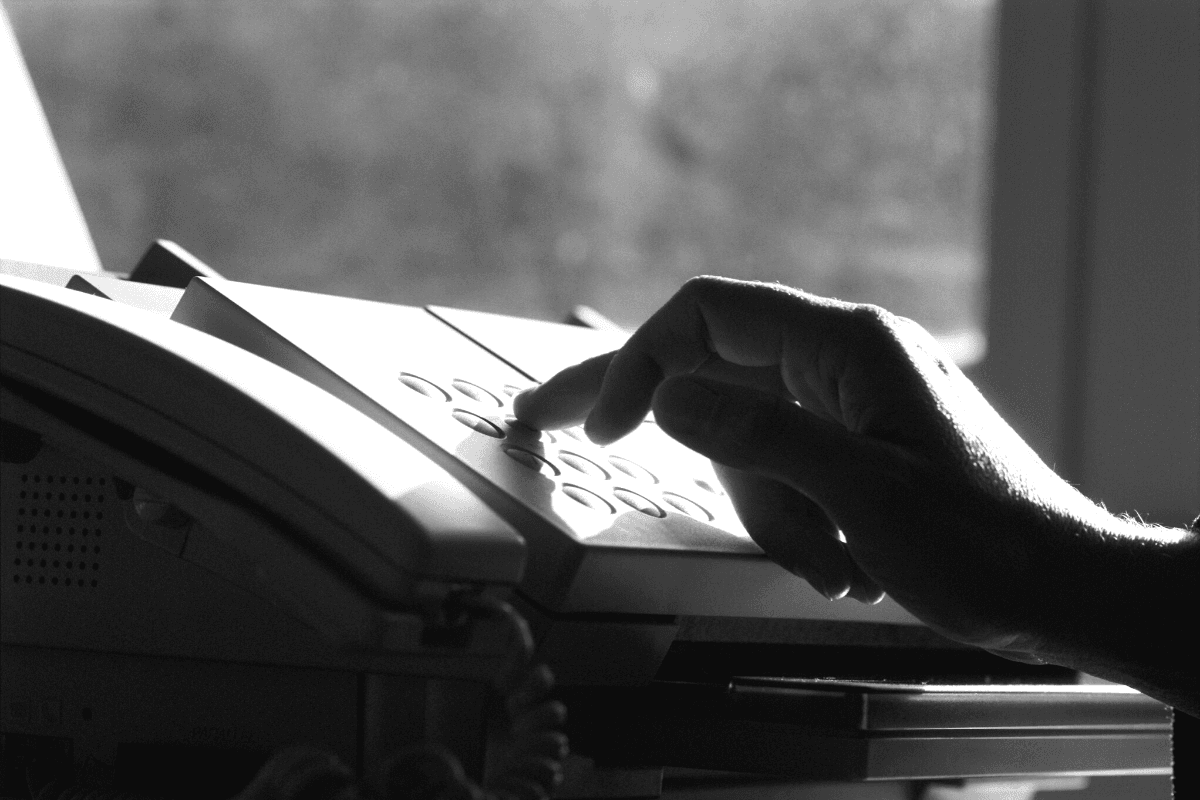Lyle’s Window to the World
For Lyle, a new Deaf Services program promises to connect her with friends and family like never before.
LYLE’S STORY
- Lyle has been a client of Ageing Well since 2015, receiving one-on-one support from Ageing Well staff members
- Like many Deaf seniors, Lyle’s primary method communication is a fax machine
- Due to the rollout of the NBN, fax lines have become more unreliable, putting many Deaf seniors as risk
- Ageing Well Manager Dr Leena Vuorinen recognised this as an area of community concern
- In 2019, Dr Vuorinen secured funding for a program to deliver iPads to Deaf seniors and train them in how to use them
- The aim of the iPad program is to empower Deaf seniors to use video-calling and other assistive technologies to reconnect with friends, families and community
- Lyle is the first recipient, working with Ageing Well volunteer Peter Cremin to connect with her brother and friends from her Deaf Seniors Group
Lyle Laker has been a client with Deaf Services’ aged care program Ageing Well since 2015, receiving regular visits from support workers and transport assistance to social activities.
While being an active and respected member of the Deaf community, Lyle lives in a Residential Care facility and—as the only Deaf resident—deals with language and cultural barriers daily.
Ageing Well is driving a new campaign to reconnect Deaf seniors like Lyle to their family, friends and community networks by training them in the use of iPads for video-calling and other assistive technologies.
Lyle was the first Ageing Well client to receive an iPad, and receives weekly visits from Ageing Well volunteer Peter Cremin to learn how to use it.

Lyle (seen here with Ageing Well volunteer Peter Cremin) can’t wait to use her new iPad to connect with friends and family.
It’s fair to say Lyle is thrilled with her new iPad. “I am looking forward to talking regularly with my brother,” she says. “I will be able to know when he is visiting me. I can also connect with my Deaf seniors group!”
Like many Deaf seniors, much of Lyle’s communication with the outside world had been conducted via a fax machine.
Unfortunately, due to the continued rollout of the National Broadband Network (NBN) and shared network capacity, many fax machines have begun to work unreliably, if at all. With fax viewed as obsolete technology, the unintended consequence is the removal of a communication lifeline to many Deaf Australians.
While Lyle is in a supported living situation, for the many Deaf seniors living in their own home, the disruption to their primary form of communication can have disastrous consequences.
For Ageing Well Manager Dr Leena Vuorinen, this was an opportunity to act.
“For many of our clients who rely on fax, it is already difficult to schedule visits,” she says. “This situation makes things worse, when we don’t even know if their fax is working.”

A fax machine can be a communication lifeline to many Deaf seniors.
The impact affects not only Ageing Well clients, but also the program’s support workers.
“My staff are often turning up to visit clients hoping they will be home,” Dr Vuorinen says, “because we have no way of checking they will be there.”
A solution came in late 2019, when Dr Vuorinen successfully applied for a grant from the Queensland Government’s Gambling Community Benefit Fund (GCBF) to begin the program.
In the same week she received the good news, Dr Vuorinen also received an email from Digital Media student Peter Cremin, expressing an interest in volunteering at Deaf Services. It was a fortuitous coincidence, to say the least!
“I emailed Peter back straight away,” Dr Vuorinen remembers. “I said how soon can we meet?”
For Peter, it was a natural fit.
“I wanted to work with Deaf Services because I wanted to experience more understanding of the Deaf community,” he says. “I was born deaf, and grew up with two hearing aids. Now I’ve got a bilateral cochlear implant.”

Soon, the program will be expanded to connect Deaf seniors with Auslan students.
Dr Vuorinen says she hopes to soon expand the volunteer pool to include students studying Auslan with Deaf Services, upskilling them on their journey to become qualified interpreters. For the Deaf seniors, the confidence they gain through better understanding technology will deliver numerous benefits.
“The skills our clients can gain through this program will allow them create and fulfil relationships with family members and friends. For those without these close relationships, our volunteers will be of such benefit.”
Your support of The Deaf Lottery will allow Deaf Services to develop and expand this project, empowering Deaf seniors to connect and strengthen new and existing relationships, reducing isolation and promoting wellbeing.
